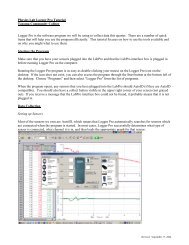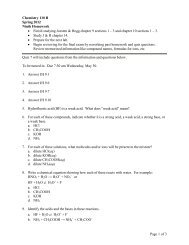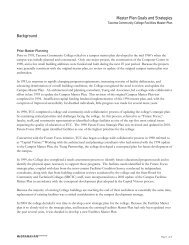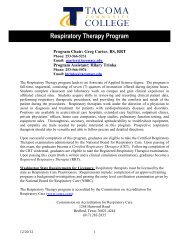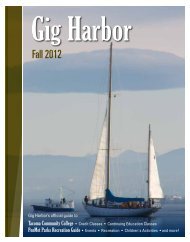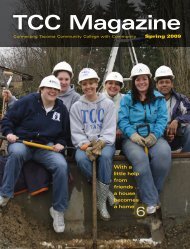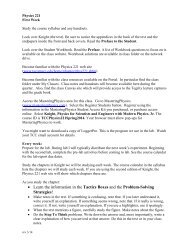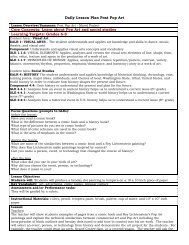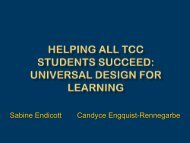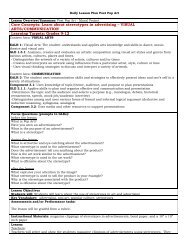2005-07 Catalog - Tacoma Community College
2005-07 Catalog - Tacoma Community College
2005-07 Catalog - Tacoma Community College
- No tags were found...
You also want an ePaper? Increase the reach of your titles
YUMPU automatically turns print PDFs into web optimized ePapers that Google loves.
96 Credit Course Descriptions<strong>Tacoma</strong> <strong>Community</strong> <strong>College</strong>ChemistryChemistryStudents seeking courses for generalinterest and degree distributionrequirements should consider thefollowing non-major courses: CHEM 100,101, and 102. These courses are alsoappropriate for students working towardAllied Health careers. Students pursuing amajor in the sciences, engineering, orsome medical fields should select coursesfrom CHEM 140, 150, 160, 231, 232, and233. An academic advisor should beconsulted to determine the appropriatecourses for your degree goal. Studentsintending to major in Chemistry at abaccalaureate institution should worktoward an Associate of Science degreewith a Chemistry Specialization.CHEM 100 (F, W, Sp, Su)Introduction to Chemistry (5)Survey of the fundamental principles ofchemistry. Includes study of the metricsystem, atomic theory, bonding, properties ofmatter, reactions, nomenclature andapplications of chemistry to everyday life.Laboratory included.Prerequisite: MATH 97, MATH 99 orTMATH 100 (Math prerequisite may be takenconcurrently).CHEM 101 (F, W, Sp, Su)Survey of Inorganic Chemistry (5)(For non-science and non-engineeringmajors.) Course includes study of the metricsystem, atomic theory, bonding, quantitativerelationships, solutions, gases, acids andbases, salts, and nuclear chemistry.Laboratory included.Prerequisite: High school chemistry or CHEM100; MATH 97, 99 or TMATH 100.CHEM 102 (F, W, Sp)Survey of Organic and Biochemistry (5)(For non-science majors.) Study ofthe structure, properties and reactions oforganic and biological compounds. Includesan introduction to biochemical processes.Laboratory included.Prerequisite: CHEM 101.CHEM 140 (F, W)CHEM 150 (W, Sp)CHEM 160 (Sp, Su)General Chemistry (5) (5) (5)<strong>College</strong>-level, freshman chemistry forscience and engineering majors.140 Study of measurements, the structureof matter, compounds, stoichiometry,classes of chemical reactions, gases,thermochemistry, and the quantummechanical model of hydrogen.Laboratory included.150 Study of electronic structure, bondingand bonding theories, molecular shapes,intermolecular forces, solids, liquids,and solutions, and chemicalequilibrium. Laboratory included.160 Study of chemical kinetics, equilibrium,acids and bases, solubility, complexions, thermodynamics,electrochemistry, and nuclear chemistry.Laboratory included.Prerequisite: MATH 115 or MATH 111 (maybe taken concurrently); high school chemistry orCHEM 101 for 140. CHEM 140 for 150.CHEM 150 for 160.CHEM 231 (F)CHEM 232 (W)CHEM 233 (Sp)Organic Chemistry (5) (5) (5)Organic chemistry for science majors.231 Study of the application of generalchemical principles to organiccompounds. Includes: structure, orbitaltheory, isomerism, and nomenclatureof organic compounds; reactions andmechanisms of alkanes, alkyl halides,and alcohols; introduction to IRspectroscopy. Laboratory included.232 Topics include: structure, propertiesand reactions of alkenes, alkynes,radicals, and aromatic compounds, andan introduction to NMR spectroscopy.Laboratory included.233 Topics include: structure, propertiesand reactions of aldehydes, ketones,carboxylic acids and their derivatives.Includes an introduction to biologicalmolecules and biochemical processes.UV/VIS spectroscopy is introduced.Laboratory included.Prerequisite: CHEM 160 for 231. CHEM 231for CHEM 232. CHEM 232 for CHEM 233.ChineseSee Foreign Language section, page 106.Communication SkillsCOMSK 100 (F W, Sp)Introduction to Critical Thinking (5)Through directed practice in reading,writing, listening, and speaking, studentslearn to recognize the structure ofarguments, to interpret texts and improvetheir critical thinking skills. They will analyze,write about and discuss carefully chosenclassical and contemporary texts.Computer Science<strong>Tacoma</strong> <strong>Community</strong> <strong>College</strong> offers a widerange of courses involving computerapplications. The courses listed below aredesigned to satisfy computerprogramming requirements forengineering and science majors. Studentsintending to major in Computer Science ata baccalaureate institution should worktoward an Associate of Science degreewith a Computer Science Specialization.Students interested in introductorycomputer courses or Business applicationsshould see courses listed underInformation Technology and ComputerUser.CS 142 (F, W)Java Programmingfor Engineers and Scientists I (5)Using the Java programming language,students learn general principles of objectorientedprogramming, including how todesign, implement, document, test, anddebug computer programs. Topics includeclasses, objects, messages, expressions,decision structures, iteration, arrays,collections, events, and interfaces. Thiscourse is the same as ENGR 142. Studentsmay receive credit for ENGR 142 or CS142, but not both.Prerequisite: MATH 115.




